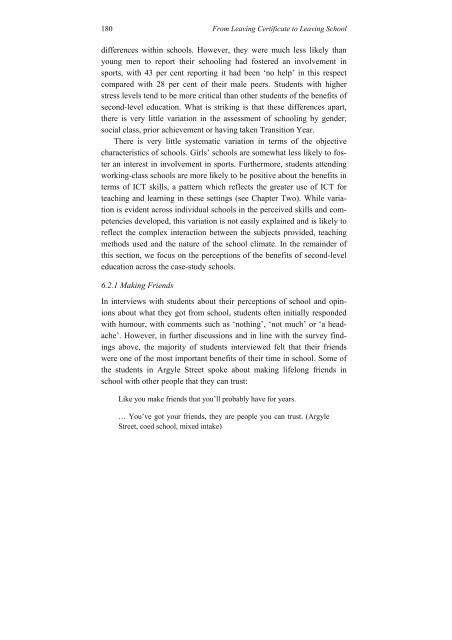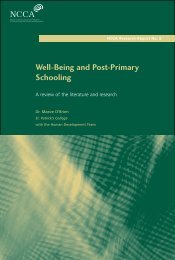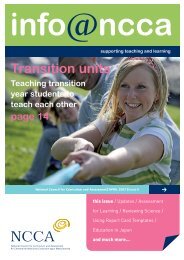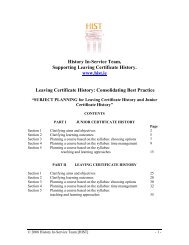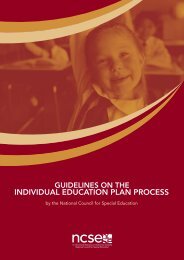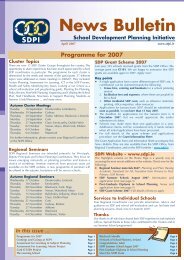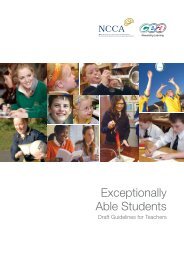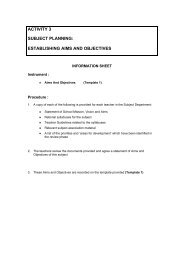- Page 6 and 7:
Published byThe Liffey PressAshbroo
- Page 8 and 9:
viFrom Leaving Certificate to Leavi
- Page 11 and 12:
LIST OF TABLES AND FIGURESList of T
- Page 13 and 14:
List of Tables and Figuresxi4.1: Av
- Page 15:
ACKNOWLEDGEMENTSThis study was fund
- Page 18 and 19:
xviFrom Leaving Certificate to Leav
- Page 20 and 21:
xviiiFrom Leaving Certificate to Le
- Page 22 and 23:
xxFrom Leaving Certificate to Leavi
- Page 25 and 26:
Chapter oneINTRODUCTION1.1 Introduc
- Page 27 and 28:
Introduction 3Choices and Challenge
- Page 29 and 30:
Introduction 51.2.1 High Stakes Tes
- Page 31 and 32:
Introduction 7of learning that are
- Page 33 and 34:
Introduction 92007). Recent decades
- Page 35 and 36:
Introduction 11views in the course
- Page 37 and 38:
Introduction 13pressure for an indi
- Page 39 and 40:
Introduction 15Table 1.2: Profile o
- Page 41 and 42:
Introduction 17Table 1.3: Senior cy
- Page 43 and 44:
Introduction 19educational and occu
- Page 45 and 46:
Curriculum, Teaching and Learning 2
- Page 47 and 48:
Curriculum, Teaching and Learning 2
- Page 49 and 50:
Curriculum, Teaching and Learning 2
- Page 51 and 52:
Curriculum, Teaching and Learning 2
- Page 53 and 54:
Curriculum, Teaching and Learning 2
- Page 55 and 56:
Curriculum, Teaching and Learning 3
- Page 57 and 58:
Curriculum, Teaching and Learning 3
- Page 59 and 60:
Curriculum, Teaching and Learning 3
- Page 61 and 62:
Curriculum, Teaching and Learning 3
- Page 63 and 64:
Curriculum, Teaching and Learning 3
- Page 65 and 66:
Curriculum, Teaching and Learning 4
- Page 67 and 68:
Curriculum, Teaching and Learning 4
- Page 69 and 70:
Curriculum, Teaching and Learning 4
- Page 71 and 72:
Curriculum, Teaching and Learning 4
- Page 73 and 74:
Curriculum, Teaching and Learning 4
- Page 75 and 76:
Curriculum, Teaching and Learning 5
- Page 77 and 78:
Curriculum, Teaching and Learning 5
- Page 79 and 80:
Curriculum, Teaching and Learning 5
- Page 81 and 82:
Curriculum, Teaching and Learning 5
- Page 83 and 84:
Curriculum, Teaching and Learning 5
- Page 85 and 86:
Curriculum, Teaching and Learning 6
- Page 87 and 88:
Curriculum, Teaching and Learning 6
- Page 89 and 90:
Curriculum, Teaching and Learning 6
- Page 91 and 92:
Curriculum, Teaching and Learning 6
- Page 93 and 94:
Curriculum, Teaching and Learning 6
- Page 95 and 96:
Chapter ThreeACADEMIC STRESS AND TH
- Page 97 and 98:
Academic Stress and the Leaving Cer
- Page 99 and 100:
Academic Stress and the Leaving Cer
- Page 101 and 102:
Academic Stress and the Leaving Cer
- Page 103 and 104:
Academic Stress and the Leaving Cer
- Page 105 and 106:
Academic Stress and the Leaving Cer
- Page 107 and 108:
Academic Stress and the Leaving Cer
- Page 109 and 110:
Academic Stress and the Leaving Cer
- Page 111 and 112:
Academic Stress and the Leaving Cer
- Page 113 and 114:
Academic Stress and the Leaving Cer
- Page 115 and 116:
Academic Stress and the Leaving Cer
- Page 117 and 118:
Academic Stress and the Leaving Cer
- Page 119 and 120:
Academic Stress and the Leaving Cer
- Page 121 and 122:
Leaving Certificate Exam Performanc
- Page 123 and 124:
Leaving Certificate Exam Performanc
- Page 125 and 126:
Leaving Certificate Exam Performanc
- Page 127 and 128:
Leaving Certificate Exam Performanc
- Page 129 and 130:
Leaving Certificate Exam Performanc
- Page 131 and 132:
Leaving Certificate Exam Performanc
- Page 133 and 134:
Leaving Certificate Exam Performanc
- Page 135 and 136:
Leaving Certificate Exam Performanc
- Page 137 and 138:
Leaving Certificate Exam Performanc
- Page 139 and 140:
Leaving Certificate Exam Performanc
- Page 141 and 142:
Leaving Certificate Exam Performanc
- Page 143 and 144:
Leaving Certificate Exam Performanc
- Page 145 and 146:
Leaving Certificate Exam Performanc
- Page 147 and 148:
Leaving Certificate Exam Performanc
- Page 149 and 150:
Leaving Certificate Exam Performanc
- Page 151 and 152:
Leaving Certificate Exam Performanc
- Page 153 and 154: Leaving Certificate Exam Performanc
- Page 155 and 156: Leaving Certificate Exam Performanc
- Page 157 and 158: Guidance and Decision-Making in Six
- Page 159 and 160: Guidance and Decision-Making in Six
- Page 161 and 162: Guidance and Decision-Making in Six
- Page 163 and 164: Guidance and Decision-Making in Six
- Page 165 and 166: Guidance and Decision-Making in Six
- Page 167 and 168: Guidance and Decision-Making in Six
- Page 169 and 170: Guidance and Decision-Making in Six
- Page 171 and 172: Guidance and Decision-Making in Six
- Page 173 and 174: Guidance and Decision-Making in Six
- Page 175 and 176: Guidance and Decision-Making in Six
- Page 177 and 178: Guidance and Decision-Making in Six
- Page 179 and 180: Guidance and Decision-Making in Six
- Page 181 and 182: Guidance and Decision-Making in Six
- Page 183 and 184: Guidance and Decision-Making in Six
- Page 185 and 186: Guidance and Decision-Making in Six
- Page 187 and 188: Guidance and Decision-Making in Six
- Page 189 and 190: Guidance and Decision-Making in Six
- Page 191 and 192: Guidance and Decision-Making in Six
- Page 193 and 194: Guidance and Decision-Making in Six
- Page 195 and 196: Guidance and Decision-Making in Six
- Page 197 and 198: Guidance and Decision-Making in Six
- Page 199 and 200: Guidance and Decision-Making in Six
- Page 201 and 202: Chapter SixLOOKING BACK, MOVING FOR
- Page 203: Looking Back, Moving Forward 179The
- Page 207 and 208: Looking Back, Moving Forward 183Bec
- Page 209 and 210: Looking Back, Moving Forward 185Thi
- Page 211 and 212: Looking Back, Moving Forward 187Com
- Page 213 and 214: Looking Back, Moving Forward 189Bri
- Page 215 and 216: Looking Back, Moving Forward 1916.3
- Page 217 and 218: Looking Back, Moving Forward 193mad
- Page 219 and 220: Looking Back, Moving Forward 195
- Page 221 and 222: Looking Back, Moving Forward 197tio
- Page 223 and 224: Looking Back, Moving Forward 199The
- Page 225 and 226: Looking Back, Moving Forward 201Sta
- Page 227 and 228: Looking Back, Moving Forward 203Yes
- Page 229 and 230: Looking Back, Moving Forward 205Jus
- Page 231 and 232: Looking Back, Moving Forward 207unl
- Page 233 and 234: Looking Back, Moving Forward 209I
- Page 235 and 236: Looking Back, Moving Forward 211Int
- Page 237 and 238: Looking Back, Moving Forward 213Jus
- Page 239 and 240: Looking Back, Moving Forward 215Oth
- Page 241 and 242: Looking Back, Moving Forward 217Som
- Page 243 and 244: Looking Back, Moving Forward 219spe
- Page 245 and 246: Chapter SevenCONCLUSIONS7.1 Introdu
- Page 247 and 248: Conclusions 223taken other subjects
- Page 249 and 250: Conclusions 225act rationally in ch
- Page 251 and 252: Conclusions 227(but do not receive)
- Page 253 and 254: Conclusions 229parents of the stude
- Page 255 and 256:
Conclusions 231with a socially mixe
- Page 257 and 258:
Conclusions 233including critical a
- Page 259 and 260:
Conclusions 235their choices. Expec
- Page 261:
Conclusions 237subject levels, and
- Page 264 and 265:
240From Leaving Certificate to Leav
- Page 266 and 267:
242From Leaving Certificate to Leav
- Page 268 and 269:
244From Leaving Certificate to Leav
- Page 270 and 271:
246From Leaving Certificate to Leav


